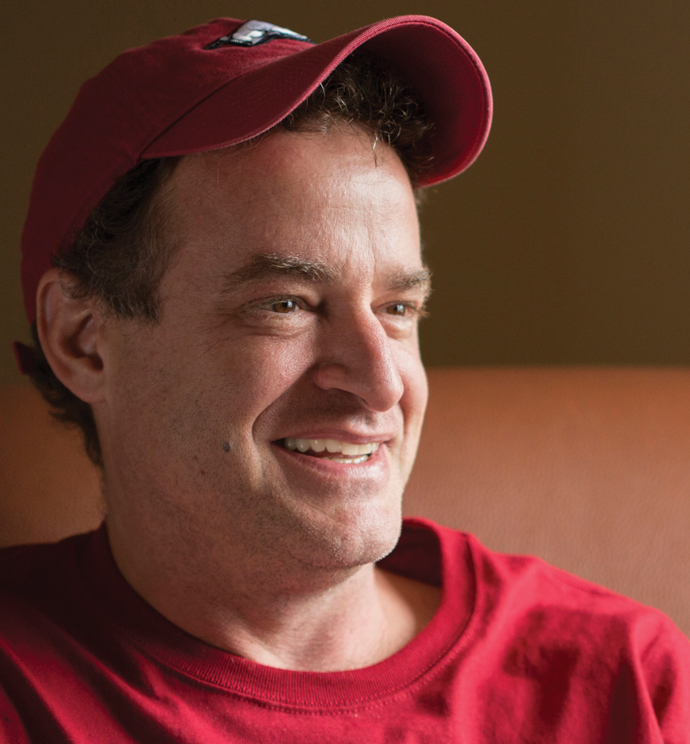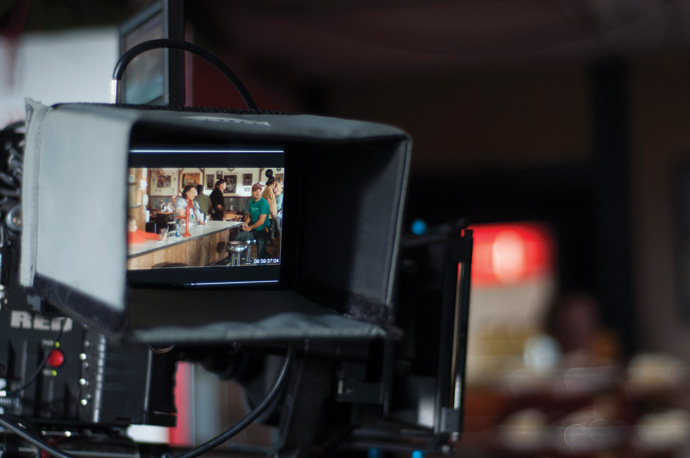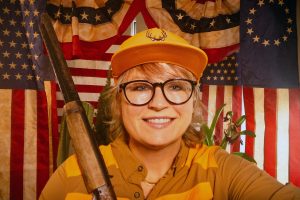The Upright Arkansan: Matt Besser chats about Upright Citizens Brigade, improv & the Hogs

WORDS / ANDREW MCCLAIN
PHOTO / COLLEY BAILEY
One evening earlier this year, Arkansan Matt Besser was entering the Upright Citizens Brigade theater when he heard a “Woo Pig Sooie!” come from the line of comedy fans that nightly stretches down Franklin Avenue in Los Angeles. Besser, who co-founded the UCB with several other sketch comics and improvisors, wheeled around to find whoever was calling the Hogs at him. While Besser isn’t unfriendly, he’s probably been called a curmudgeon once or twice, but he said, “I’ll talk to anyone who calls the Hogs at me in Los Angeles.”
Besser, who grew up in Little Rock, can be seen in the 2007 documentary Towncraft, where he speaks about his involvement in the ‘zine culture surrounding the Little Rock punk scene at the time. He left Arkansas for college in Amherst, Massachusetts, then to Chicago, where he discovered improv.
Modern improvisational theater began as a method for writing sketch comedy and has been used in acting classes for years, but only relatively became its own art form recently. So recently, in fact, that its history is very well documented. Most of it can be traced to Del Close, one of comedy’s modern day academics, who wrote and taught extensively on the subject. Besser was among the last group of students to study under Close at ImprovOlympic before his death in 1999.
While Besser isn’t a national household name, the circle of performers who keep his company are among comedy’s elite, and his name is known throughout the comedy world. Besser co-founded the Upright Citizens Brigade with Adam McKay (director of Anchorman, Talladega Nights, and cofounder of FunnyOrDie.com) and SNL’s Horatio Sanz, (who accompanied Besser to Fayetteville for an improv show in September) and frequently collaborates and improvises with Amy Poehler (star of NBC’s Parks & Recreation).
The impact of the Upright Citizens Brigade theater on the alternative world of comedy is impossible to measure. After the stand-up boom of the 1980s, live comedy took place exclusively in places with names like the Laff Stop, the Funny Bone, or the Chuckle Hut, with a two-drink minimum and a lowest-common-denominator sensibility. The little black-box UCB theater, first in New York, then in Los Angeles (now with three locations), became the venue for alternative comedy, with $5 and $10 shows, and improv classes. Most young comic performers you see on TV have passed through the UCB.
True to its academic-sounding initials, the UCB’s comedy curriculum, which Besser helped develop, has become a bastion of comedy education. This year, Besser, with Matt Walsh and Ian Roberts, published The Upright Citizens Brigade Comedy Manual, an effort to condense the curriculum and offer some standardization on the confusing and ill-defined terms that performers use when talking about and teaching improv.
“Like most new things, [improv] is going to have to come up with its own lingo, its own language to explain whatever that new thing is. Improv, relatively speaking in the history of theater, is really new. It was only invented in the ‘60s so there are a lot of concepts that didn’t have codified, agreed-upon words or phrases to describe what they’re talking about, so you could go from one school to another school and get confused because they were speaking different languages. So the effort of our manual is to try to define some of the words and phrases that have been used within improv,” Besser said.
Besser has a podcast called Improv4Humans where he and a rotating group of guests (including SNL alumni Tim Meadows, Amy Poehler, and others like Andy Daly, Maria Bamford and Martin Starr) do long form improv. Besser has managed to make this podcast a complete embodiment of what he wants out of improv, and the result is always hilarious.
Improv actually shares a good number of attributes with athletics, in that the outcome of any sporting event is unknown and can go any number of directions within its own framework, depending on the abilities and chemistry of the players, and improv is no different in this respect.
Though Besser is best known for and most passionate about improv, he has always kept one foot in the world of stand-up comedy, though he usually appears as characters on stage (among them: Pope Benedict XVI, Zeus, Satan and Bjork). Several years ago, however, Besser wrote and performed a one-man show as himself, entitled “Woo Pig Sooie: Comedy for Atheists.” The show, recorded at the end of George W. Bush’s tenure in office, dealt with Besser’s childhood in Arkansas and some of his frustrations with organized religion.
“It’s called that because my religion is the Razorbacks, but you’ll never find time on a Saturday knocking on someone’s door, telling them if they don’t call the Hogs they’re going to hell,” he said.
In the show, Besser recounts memories from his childhood, growing up with a Jewish dad and a Christian mother in Little Rock, and attending Kanakuk, (a Missouri sports camp well-known to Arkansans who grew up in Christian circles) where his Jewish heritage was viewed as theologically suspect.
Besser’s personality is easygoing for the most part, but he has a strong confrontational side. After returning from his Arkansas trip, Besser recounted an altercation at Razorback Stadium in which he shouted Aggie jokes while surrounded by a group of Texas A&M fans.
Sometimes Besser does mini-episodes of Improv4Humans in which he fields comedy-related questions directed at him. Recently, someone asked him about the return of Whose Line Is It, Anyway?, the massively popular show whose format is based around improvisational games, and Besser openly admits to having feelings of animosity towards the show’s popularity. “Whose Line is so different – almost opposite of what I do, and honestly, to call it ‘improv’ makes me ill.”
Besser seems to greatly prefer life in Los Angeles, but retains quite a heart for the Middle America that he came from. The fans in line at UCB turned out to be from Poplar Bluff, MO – not far from the northeastern border of Arkansas. The UCB theater was at capacity, but after talking, Besser let Matt and Michael (last names unavailable) in to watch the show from backstage. The two of them were interested in improv, but had no access to a venue or any sort of coaching in Poplar Bluff. Besser saw an opportunity to test the recently published UCB Comedy Improvisation Manual, and sent Michael a copy and told him to assemble a team and offered them several slots at the Del Close Marathon, an annual comedy festival in New York.
Michael assembled his team and showed up at the Del Close Marathon and reportedly did very well. You can hear Michael on an episode of Improv4Humans recorded live at the Marathon when Besser invited him up to do a scene with Ian Roberts and Amy Poehler, and while he seems soft-spoken at first, he really held his own in a scene with the all-stars of improv. This gesture speaks to Besser’s character as much as any Aggie joke does.
GLOSSARY:
– long-form improv: Besser defines what he does as “long-form,” in which scenes can run long or short, but improvisors make it their goal to build a strong narrative reality in which to play. In long-form, improvisors are searching for the game. Long-form scenes may be long or short.
– Harold: A specific form of long-form improv developed by Del Close (named “Harold” after no one in particular) with multiple acts, tying themes and stories together throughout.
– short-form improv: Developed as an acting exercise, it is a game that is given to the improvisors literally, like “Whose Line Is It Anyway?”
– game: The verbal and intellectual exchange that a scene hinges on(I like this first sentence a lot, but I disagree totally with the next one, and feel it should be changed) – usually some sort of tension, conflict, or central conceit of the scene. (SOMETIMES, not usually, and rarely successfully. I’d say the game is what the performers find most playful about their situation or relationship, actually the opposite of tension <whether or not it reads as tension.> )
– “yes, and”: the best-known rule of improv, which directs improvisors to build on each other’s ideas with agreement, rather than trying to direct the reality of a scene alone.
– heightening: Besser explains heightening as “if this absurd thing is true, then what else is also true?” as an extrapolation of “yes, and.”




Comments
Comments are closed.